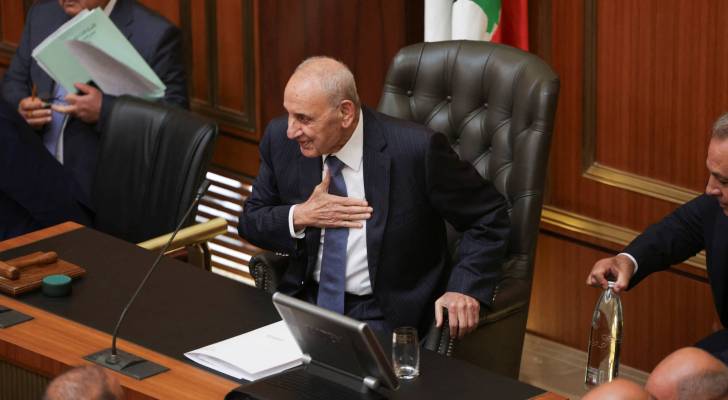Nabih Berri, Speaker of the Parliament of Lebanon in today's session on July 15, 2025.
Hezbollah disarmament dominates Lebanese Parliament amidst 'Israeli' strikes
The Lebanese Parliament convened a general session today, Tuesday, July 15, to discuss the government's policies, with the contentious issue of Hezbollah's weaponry dominating proceedings.
The session saw renewed and sharp calls for the state to exclusively control all arms in Lebanon.
This parliamentary debate, the first of its kind in a long time, according to Deputy Speaker Elias Bou Saab, occurred against a backdrop of heightened tensions.
During the session, 'Israeli' aircraft conducted low-altitude overflights, including over Beirut, later on, intense 'Israeli' airstrikes targeted the eastern and western Lebanese mountain ranges. These strikes reportedly resulted in at least 12 fatalities, including Syrian and Lebanese nationals, and 7 injuries.
Calls for state monopoly on arms
During the morning session, the Lebanese Forces party prominently called on the government to establish a clear timetable for Hezbollah's disarmament. MP Georges Adwan stated, "This is the government's last chance and there's a need to move quickly.
The government must hold the decisions on war and peace." This position was supported by MP Pierre Bou Assi, who added, "Everything must begin with strengthening sovereignty. 'Israel' will not withdraw from southern Lebanon before Hezbollah's weapons are withdrawn."
Other lawmakers, including independent MP Michel Moawad, also pressed the government on its plan and timetable for resolving the arms issue. MP Yassine Yassine emphasized that the "arms monopoly is not a slogan but a constitutional and political rule without which the state and the presidency will not be able to recover."
Despite the Lebanese constitution stipulating the exclusivity of weapons in the hands of the state, implementing this principle remains a major point of political division. Deputy Speaker Elias Bou Saab acknowledged the session would likely feature "contradictory statements from all sides, as well as calls for a monopoly on arms and for reconstruction." He also questioned the government's commitment to the Taif Agreement's national accord document, which calls for liberating Lebanese territories from Israeli Occupation.
US roadmap, escalating tensions
The parliamentary discussions coincided with Lebanon's review of Washington's response to proposals from US envoy Thomas Barrack. Barrack's "roadmap" for peace in the region includes a demand for a timeline for Hezbollah's disarmament and other armed factions, with a clear implementation mechanism to be set by the Lebanese government. Sources indicate that the US has given Lebanon until the end of the current year to resolve the Hezbollah weapons issue.
Hezbollah's stance remains firm, with its chief Naim Qassem stating that the group would not disarm until 'Israel' ends its aggression and withdraws from southern Lebanon. He previously asserted that Hezbollah's weapons would not be on the negotiating table unless 'Israel' "withdraws from the occupied territories, stops its aggression, releases the prisoners, and reconstruction begins."
MPs in the session also urged the government to take a firm stance against the ongoing Israeli violations of the ceasefire. 'Israeli' Defence Minister Israel Katz, on Tuesday, stated that 'Israeli' military strikes underway in Lebanon send a "clear message" to Hezbollah, accusing the group of plotting to rebuild its forces.
Crossroads for Lebanon
The parliamentary session underscores the sensitive political crossroads facing Lebanon. The domestic push for disarming militias, particularly Hezbollah, intertwines with ongoing calls for a complete 'Israeli' withdrawal from occupied Lebanese territories.
Lawmakers demanded transparency regarding the US proposal and the government's responses, asserting that such critical decisions involve not just the government, but the Parliament and all Lebanese citizens.




